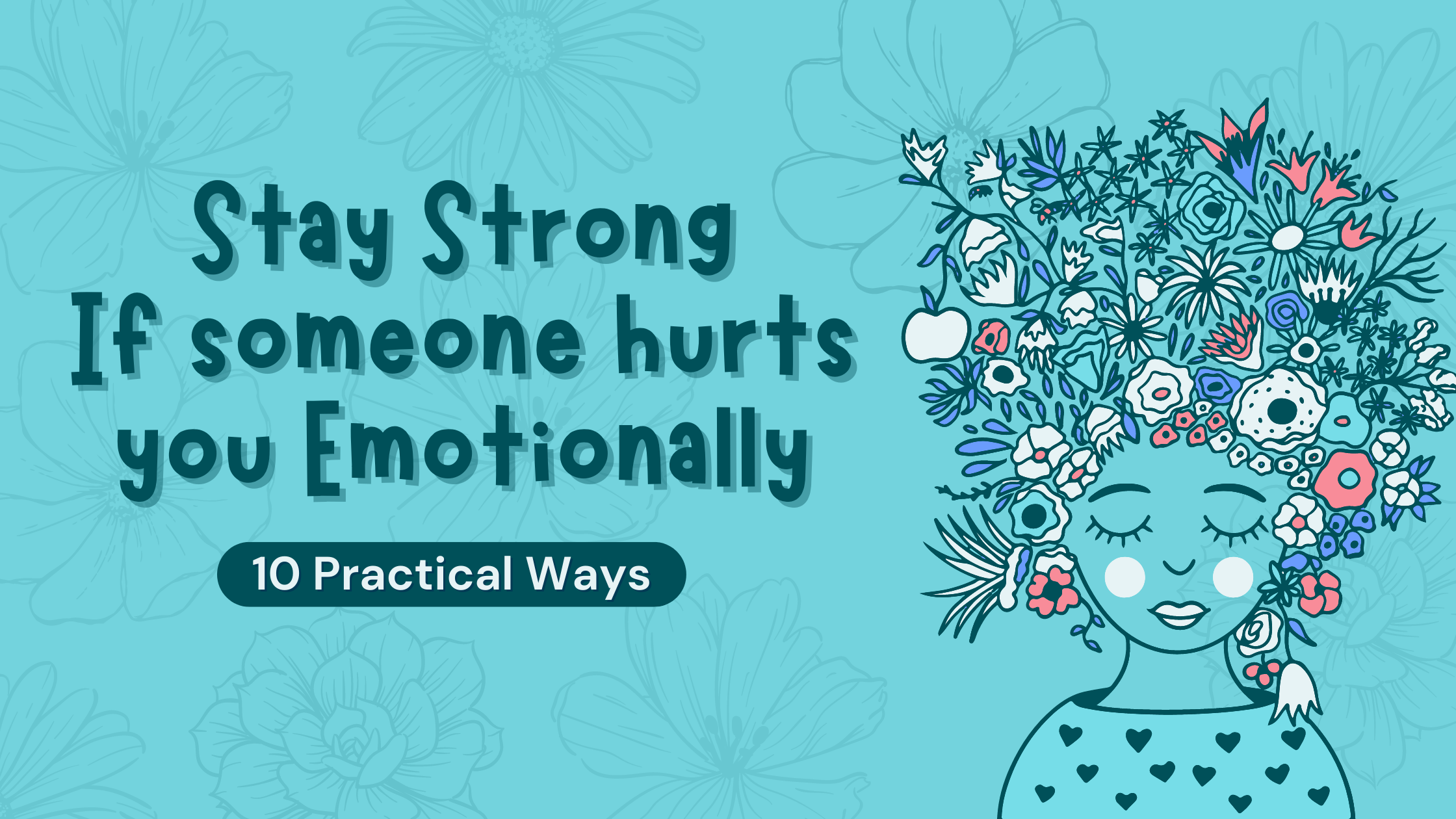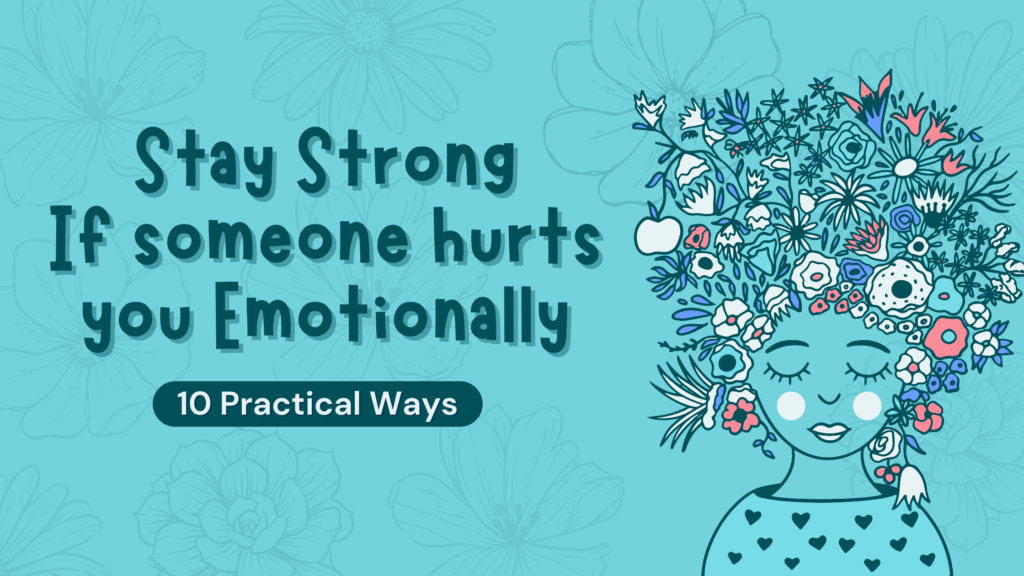When someone hurts you, it can be challenging to stay strong. But you can become stronger and happier if you learn how to manage your emotions.
Every person on this planet has felt the pain whether it’s a relationship, marital problems, or losing someone. The situation may vary, whether it is your father, mother, friend, or brother, but the feeling will remain the same. If you are in this situation, I am sure you are going through a tough time.
If you are an emotional person, you will be more sensitive to the emotional pain of others. If you are also emotional, you will feel the pain of losing someone very deeply. You may also think that no one can understand what you are going through and that the loss of someone is not possible.
In the article How to Keep Strong When Someone HURTS Emotionally, I talk about a couple of ways to deal with emotional pain that can get in the form of our ability to stay strong.
10 Practical Ways to get of out Emotional State
Find a way to forget.
It is natural to feel the pain when someone hurts you emotionally. But you must understand that the pain will only fade when you let it go. So, the best way to eliminate the pain is to forget.
Once you understand what you’re dealing with, it’s time to consider what you can do about it.
First, you should start by asking yourself, “Why do I want to stop feeling this way?” This is a big part of the healing process. You need to know why you want to change. You can’t just change because you feel wrong about something.
Release the Fear
We all have fears. But it’s important to recognize that those fears come from somewhere. When we’re afraid of something, it’s because we’ve been hurt somehow. Whether from experience or just our imagination, it’s essential to release that fear. So we need to find out why we’re afraid. When we can’t answer that question, it’s time to release the fear.
In the same way, when you release the fear that someone has hurt you emotionally, you can help people overcome it. Being vulnerable is not easy, but if you can be honest with yourself and your audience, you can help others see the bigger picture.
Focus on the positive aspects of life
The first principle in emotional influence is the “focus on the positive aspects of life.” This means that when someone hurts us emotionally, we should always focus on the positive aspects of our lives.
If we are hurt because we feel like we don’t have enough money to pay off our debts, we should instead focus on all the ways we have money. We can also focus on all the good things that we have. This can help us forget what we are not having and remember all the good things we are.
Release the Guilt
We all know that guilt is a powerful emotion. But when it comes to persuasion, it’s often the last thing you want to do. Guilt is a negative emotion, and it makes people defensive.
To overcome this, you need to tap into the positive emotions that are already running high in your prospect. Think about how your prospect feels when they see you as their advocate. How do you feel when you’re helping someone? Do you feel happy, proud, or motivated? These feelings are usually the best starting points for a persuasive conversation.
Remember the Good Times
We all have been hurt emotionally at some point. We all have experienced someone else hurting us. But did you know that emotional pain can become a trigger for you to act in ways that you don’t want to act? That’s why it’s important to remember the good times when someone hurts us emotionally.
By remembering those times when someone hurt us emotionally, we can use those memories to change our behaviors and learn how to handle similar situations better.
Talk to people who have experienced similar pain.
You’ll have to be careful about this, but it can be helpful. When we’re talking about emotional pain, we’re not just about physical or social distress.
We’re talking about the type of hurt that comes from being betrayed, cheated, lied to, or taken advantage of. People who have been through this kind of emotional pain will be the most familiar with how to deal with it. They’ve been there, and they know the ins and outs.
Don’t Dwell on the Past
This one’s a bit easier to apply than the previous three, but it still comes down to knowing how to use your emotions to your advantage.
You don’t need to dwell on the past if you’re feeling hurt and angry. Instead, imagine the desired future. Think about what you want to feel instead of what you used to feel. Then think about how you want to handle the situation differently in the future.
We’ve all been there. An argument with our spouse or significant other, a disappointing business deal, or some other event in our life that makes us feel like a failure. Whether you’ve recently had a bad day at work or you’ve been struggling with a particular aspect of your life for years, we can all relate to this feeling of shame.
But, as the saying goes, “it takes two to tango.” The trick is learning to let go of the past and focus on moving forward.
Learn From the Mistakes
I’ve been hurt many times, and my response is always the same. I think of all the things I could’ve done differently to prevent it, but I’ve learned that there’s nothing I can do about it. The only thing I can do is learn from the experience and move forward. I know that it’s a part of life and that I should try to see the positive side of everything.
Take Control
We all experience emotional pain, whether it’s due to loss, failure, rejection, or any other adverse event in our lives. But there’s one thing you can do to take control of the situation and turn it into something positive: take responsibility for your feelings.
Don’t blame yourself or someone else. Instead, acknowledge your emotions and accept them. The next step is to decide what you’ll do about them.
Trust Yourself
I’m sure you’ve heard this advice before, but it’s worth repeating: trust yourself when someone hurts you emotionally. In other words, if someone hurts you, it’s OKAY. It doesn’t mean you’re weak, stupid, or incapable of handling the situation. It means that the person who hurt you was wrong, and you’re right.
Conclusion:
In conclusion, it’s essential to keep strong and remember that you’re a survivor. You will face challenges in life, but if you have a solid foundation, you can rise above adversity. In addition, it is helpful to understand that everyone goes through tough times in life. So, don’t let others’ negative comments bother you, and keep moving forward.
So, if you find yourself where you need couples counseling or any other type of mental health assistance, reach out to Richmond Counseling to take care of your mental health.



